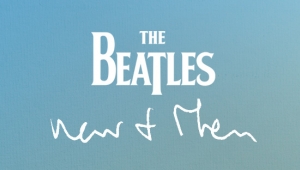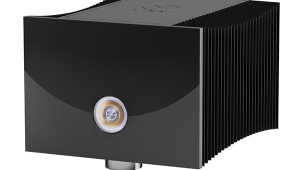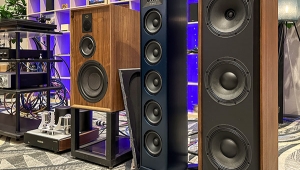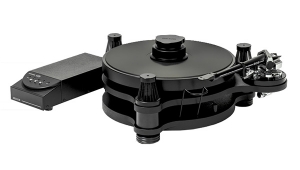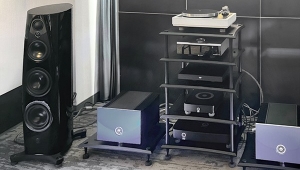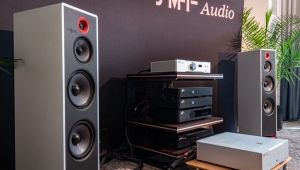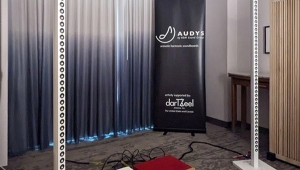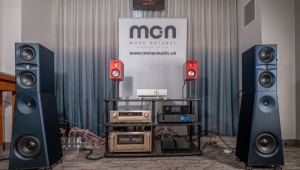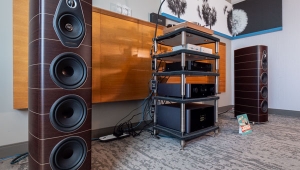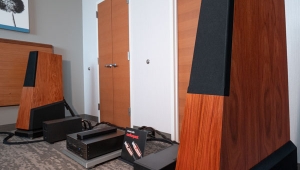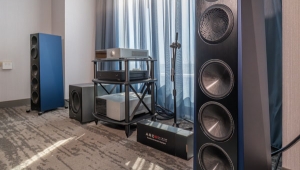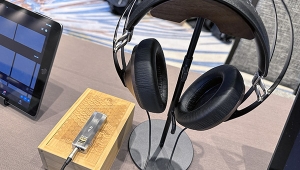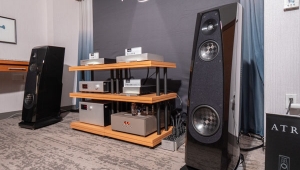| Columns Retired Columns & Blogs |
March 2024 Jazz Record Reviews

Rufus Reid: It's the Nights I Like
Reid, bass; Sullivan Fortner, piano
Sunnyside SSC 1730 (CD, available as LP on Newvelle). 2024. Reid, prod.; Marc Urselli, eng.
Performance ****
Sonics *****
Reid, bass; Sullivan Fortner, piano
Sunnyside SSC 1730 (CD, available as LP on Newvelle). 2024. Reid, prod.; Marc Urselli, eng.
Performance ****
Sonics *****
With a piano/bass duo recording, it is natural to think the piano player will dominate the proceedings, even when the bassist is the leader. The temptation is even stronger when the pianist is one of the hottest young stars in jazz: Sullivan Fortner placed fourth on piano in the 2023 DownBeat Critics Poll, ahead of Brad Mehldau.
Here, such an assumption is wrong. Rufus Reid, a great elder statesman of jazz, presides magisterially over his album. Reid came up in the 1970s, when jazz bassists mostly pursued a low-frequency art. Today, there are more bass virtuosos than ever, brilliant soloists who love the instrument's upper register. They can make the bass as quick as a guitar.
On a Charles Mingus classic, "Duke Ellington's Sound of Love," Reid reminds us that he is a bass (versus treble) player. His dark, resonant, powerful notes shake your floor. They rock your soul. No instrument is more commanding, more physical in its passion than an acoustic bass in the right hands.
That Reid devotes himself to the deeper sonorities of his instrument does not render him less articulate as a soloist. He plays Ellington's "Sophisticated Lady" and makes the melody sing. Jimmy Rowles's "The Peacocks" is not often performed as a bass feature; it is a delicate, elusive, haunting song. Reid's interpretation plumbs new depths of poignance—it never sounded more profound.
Marc Urselli's superb engineering is a huge reason for this album's sonic, aesthetic, and emotional impact. It's the Nights I Like is a reference-quality recording of an acoustic bass.
As for Fortner, his piano work here, also beautifully recorded, justifies the buzz about him. In this minimalist setting he picks his spots, offering only lyrically pristine bare essentials.—Thomas Conrad

Frank Sinatra: Sinatra Platinum
UME/Capitol/Signature Sinatra 5575097 (4 LPs). 2023. Charles Pignone, compilation prod.; Larry Walsh, mixing and audio restoration eng.
Performance *****
Sonics ****
Francis Albert Sinatra signed with Capitol Records in 1953. A series of smoothly produced albums whose arrangements never rose above a midtempo beat followed. While Sinatra wanted to run his own show and kick up the tempos—eventually founding Reprise Records in 1963—the Capitol years arguably contain his finest singing. By then his phrasing was his own and his voice was at its peak. Here the Sinatra family and Universal Music continue to mine the singer's recording catalog by producing a coffee table book, four-LP compilation of the singer's Capitol years (1953–1961). Meant for casual fans and those looking for a conversation piece, it's organized chronologically but comes without any production credits.
When questioned, UME confirmed that this set uses a mixture of tape and high-resolution sources, as well as fresh remasters by Larry Walsh (who has been remastering the Sinatra catalog since the late 1980s). The lacquers were cut by Kevin Reeves at East Iris Studios in Nashville, Tennessee, and the LPs were pressed in the Czech Republic at GZ. That last step keeps the sound from being a huge improvement.
No surprise, the classics of Sinatra's Capitol catalog remain unassailably wonderful. Judged purely on the quality of his vocals, renditions of "I've Got You Under My Skin" or "Come Fly with Me" were not surpassed by his later up-tempo Reprise re-recordings. While the snap and sly wisdom in the Reprise version of "The Lady Is a Tramp" mark it as definitive, the singing on this version is superior. And while overripe and slathered in violins, a weepy ballad like "Where Are You?" still has breathtaking vocals. An LP of alternates, outtakes, and an amusing radio spot—four of which are previously unreleased—is essential for hardcore fans. Overexposed? Definitely. Essential? Without question.—Robert Baird

Bill Anschell: Improbable Solutions
Anschell, piano, electronic sound design; five others
Origin 82886 (auditioned in WAV, available as CD). 2023. Anschell, prod.; Reed Ruddy, Anschell, engs.
Performance ****
Sonics ****½
Digital music technology keeps expanding within the jazz art form. Digital tools come with risks. Many musicians treat them like fun toys; as they twist knobs, musicians are often having more fun than their listeners. But electronics can open vast landscapes of sonic possibility for artists who remain committed to fundamental values like musicality and taste.
One is Bill Anschell. He has been the best mainstream jazz pianist in the Pacific Northwest for years. His new project represents a radical departure in creative process. When you put on this record, you hear a well-recorded acoustic piano trio hitting hard on a dynamic tune called "Ambulator." Anschell's favorite rhythm section, bassist Chris Symer and drummer Jose Martinez, is kicking ass. Then you notice that a guitar (played by Brian Monroney) is peeking out in the open spaces. You hear an evocative sound, perhaps wind or the sea, around the edges of the piano notes.
The third track, "Gentle Persuasion," is quieter but even more striking. The wistful melody is portrayed by a rich, resonant piano. Mysterious whisperings in the distance, suggesting a string orchestra, gently push back the horizon of the music.
But there is no acoustic piano. Anschell prerecorded all the piano parts in his home studio, assembling them from software synthesizers and keyboard samples. He even created scratch bass and drum parts electronically. But then, in a recording studio in Seattle, he turned Symer and Martinez loose to replace those parts. Monroney added his guitar touches in Anschell's home studio. Also in his home studio, in an undertaking that required many months, Anschell sculpted nine tracks into an organic whole. This fascinating album will mess with the minds of purists who still distrust digital music technology.—Thomas Conrad

Nitai Hershkovits: Call on the Old Wise
Hershkovits, piano
ECM 2779 (CD, available as LP). 2023. Manfred Eicher, prod.; Stefano Amerio, eng.
Performance ****½
Sonics ****½
One of the most powerful concerts your present correspondent witnessed in 2023 took place in October at the Belgrade Jazz Festival in Serbia. Timing was part of it. Everyone in the auditorium was aware that Oded Tzur, tenor saxophonist of Israel, was performing a few days after his country had been attacked and gone to war. When Tzur came on stage he announced, "This music was written about love. I never thought we would play it at such a moment."
His set was a dark, solemn, incantatory ceremony. Tzur was brilliant, but after the concert everyone was talking about his piano player. Nitai Hershkovits is also from Israel. Every time he soloed that night, he stopped time. His playing touched many worlds and many dimensions: rhythms of the Middle Eastern street; Western classicism; emotional crisis; crystalline lyricism.
Now Hershkovits's ECM debut is here. The format is unusual, with 18 short tracks of solo piano, mostly improvised. The ambience is inward and searching. As his thoughts and feelings flow, Hershkovits again and again comes upon unfamiliar iterations of beauty. The format imposes its own limitations; five tracks are under two minutes and six more are under three. Sometimes these miniatures only have space for one idea, one gesture. But they never sound random or slight. From free air—in the moment—Hershkovits snatches complete songs. There are gradual ascents to chiming epiphanies in "Enough to Say I Will," revelations of the deepest yearning with "Of Trust and Remorse," and one-minute distillations of melody, preserved as if in amber on "Mode Brilliante."
There are two well-chosen covers. "Dream Your Dreams" is by Molly Drake; Hershkovits rends your heart with it. Duke Ellington's "Single Petal of a Rose" becomes a mantra, a foundation for lavish, swirling piano inventions.—Thomas Conrad
- Log in or register to post comments












